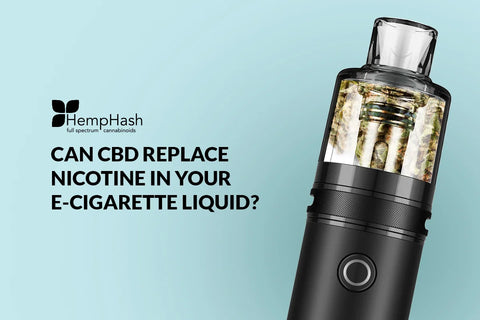In recent years, the popularity of electronic cigarettes and vaping has seen a significant rise amongst individuals looking to quit smoking or find an alternative source of relief for their nicotine cravings. Many are now exploring the potential of replacing nicotine with CBD in e-liquids, but does it really work? In this article, we will delve into the science behind this emerging trend and explore whether or not CBD can be a suitable replacement for nicotine.
The Basics: Understanding CBD and Nicotine
Nicotine is an alkaloid found naturally in the tobacco plant. It releases dopamine and serotonin in the brain, making its users feel relaxed and satisfied. However, prolonged exposure to nicotine leads to dependency and, eventually, addiction. On the other hand, CBD is a non-intoxicating cannabinoid found in the cannabis CBD flower. It's known for its wide range of therapeutic properties such as pain relief, stress reduction, and anti-inflammatory effects, without causing a psychoactive "high" like its cousin, THC. While both compounds interact with the body's endocannabinoid system, they differ significantly in how they affect the user's experience.
Dependency vs. Addiction what is the Difference?
Dependency refers to the physical need for a substance due to the build-up of tolerance, while addiction is characterized by detrimental consequences and compulsive behaviours despite knowing these negative outcomes. Nicotine creates both dependency and addiction, while CBD use may only lead to a mild form of dependency without addictive behaviours.
What potential health benefits could come from replacing nicotine with CBD?
Reducing Withdrawal Symptoms
As smokers begin to quit or reduce their cigarette consumption, they often experience withdrawal symptoms such as anxiety, irritability, and cravings. CBD acts on the body's endocannabinoid system in a similar way to nicotine but without causing dependency or addiction, which can potentially help alleviate withdrawal symptoms.
Combating Inflammation
Cigarette smoke exposes its users to various harmful chemicals and toxins that can contribute to chronic inflammation in the body. CBD is known for its anti-inflammatory properties and may help combat inflammation caused by tobacco use.
Improving Sleep Quality for Smokers Trying to Quit
Nicotine withdrawal often results in disrupted sleep patterns, making it difficult for smokers trying to quit to get a good night's rest. CBD has been shown to have positive effects on sleep quality, which could be beneficial for those struggling with sleep issues due to quitting smoking.
Considerations When Replacing Nicotine with CBD
Although there are potential benefits of using CBD as an alternative to nicotine in e-liquids, several factors must be considered:
- Dosage: Finding the optimal dose of CBD may require a trial-and-error process as individual reactions may vary, as well as considering the frequency of use and preferred strength of the vaporized product.
- Legality in UK: In some countries and states, CBD may still be categorized as a controlled substance or subject to specific regulations regarding its sale and distribution. It is essential to research local laws before purchasing CBD-infused e-liquids.
- Purity and Quality: As the CBD market remains largely unregulated, it is crucial to purchase from reputable sources that provide third-party testing to ensure the purity and potency of their products.
Is CBD the Future of Nicotine Replacement?
While it's still too early to draw concrete conclusions, there is promising evidence that replacing nicotine with CBD in e-liquids or CBD oil may provide potential health benefits for smokers looking for alternative relief from nicotine cravings. With continued research and advancements in product development, we might soon see a greater prevalence of CBD-infused e-liquids as useful aid in smoking cessation and improving overall health and wellbeing.
The Bottom Line
In summary, while CBD may not be a perfect replacement for nicotine, its therapeutic properties can potentially help to alleviate some of the withdrawal symptoms associated with quitting smoking. Considering the differences between CBD and nicotine discussed in this article, further studies are needed to fully understand the scope of CBD's effectiveness as a nicotine substitute. In the meantime, it remains crucial for users to consult with medical professionals before using CBD to replace or supplement their nicotine consumption.



